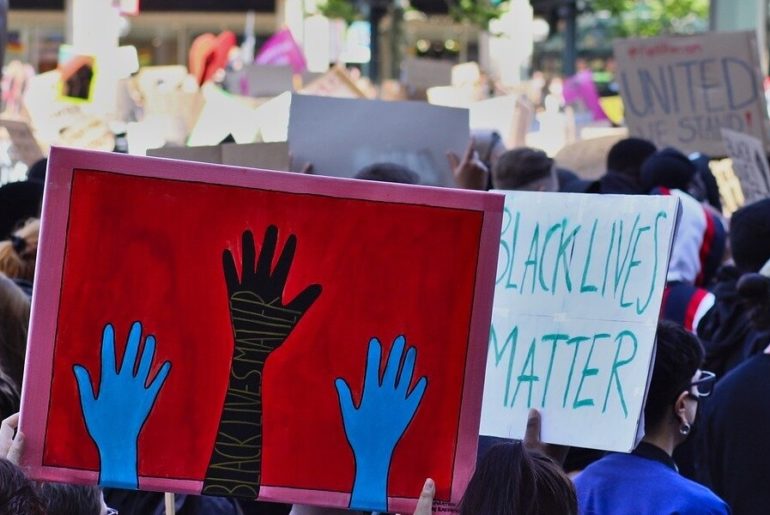Tu lucha es mi lucha. Those are the words written on the hundreds of billboards Mexican protesters held during a gathering in front of the U.S. embassy in Ciudad de Mexico to protest the deaths of black Americans at the hands of the police.
“We are here to remember the black lives that have been killed by the police in the United States where racism is an integral part of its systems and institutions,” one of the activists at the event told EFE.
For the last two weeks, the U.S. has been witnessing history unfold as the Black Lives Matter movements take to the streets to protest the death of black people at the hands of the police. The protests were sparked by the killing of George Floyd, a black man who was held in a knee-chokehold for almost 9 minutes.
“As a Latina I support this movement,” Victoria López, A Chicana journalist, told Revolution English. “I feel deeply saddened and angered by what has been happening for years to the brown and black community. I feel a sense of pride that it is happening and people are rising. And pushing to be visible in a society that wants us to dissolve in it and remain in the margins.”
López, like many other Latinx people, have joined the fight of black people demanding equal treatment from the authorities. She argues that Latinx and black people “are affected by similar if not the same issues and discrimination.” Janet Murguía, the President and CEO of the oldest and largest Latino rights organization in the country, Unidos U.S., shares a similar opinion.
“What affects our black sisters and brothers affects all of us,” Murguía said on a special edition of NBA Together Roundtable. “And until we achieve justice for black people we won’t have justice for anyone else.”
As of right now, one threat that unites both communities is the Coronavirus. According to public health research, Latinx and black people face a much higher risk of dying of COVID-19 than any other group. This is largely in part because of the lack of resources available in black and Latinx communities across the country. But diseases are not the only thing affecting both groups.
“There is an interesting dynamic when it comes to law enforcement and our community,” Paola Ramos, host and correspondent for VICE News and contributor for Telemundo and MSNBC, said on the NBA Together Roundtable.
In the panel, Ramos brought up the death of Sean Monterrosa, who was killed outside a Walgreens store where officers were responding to reports of looting in Vallejo, California. Ramos goes on to question the public view of Monterrosa in which, according to her, was depicted as a criminal and gang member instead of a 22-year old boy who, as his family has said publicly, “was involved in youth groups and was very active in his community.”
“I think the problem in our community is that we have made immigration our main fight, but not so much when it comes to police brutality or criminal justice,” Ramos said. “If we are being criminalized in the immigration system, we are being criminalized in every other system.”
Nevertheless, Ramos said the important thing is to unite and fight the injustices that face them. Many Latinx organizations and activists have joined the movement in an effort to expand the voices of their black fellows and voice similar issues faced by their communities. However, you don’t need to be part of an organization to be a valuable ally to the movement.
“[We can] get out of our comfort zone and educate ourselves, read, do research, attend each other’s events with respect and open hearts and minds,” López said. “Protect the space our brothers and sisters are holding and follow their lead. Minds cannot be changed from one day to another but the truth will always rise.”
Above all, according to Murguía, the most important thing is to never stop fighting for each other.
“‘Tu lucha es nuestra lucha.’ Your fight is our fight,” Murguía said. “And we are joined in this fight today. It has never been more important for us to be together in this struggle and this fight for change.”

